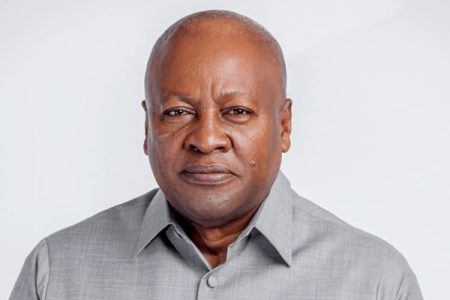President John Dramani Mahama has pledged that his administration will tackle the country’s energy challenges head-on to ensure there is no return to the dreaded power outages, commonly known as dumsor.
Speaking at the 92nd National Convention of the Ahmadiyya Muslim Mission, Ghana, in Accra, just two days after his inauguration, President Mahama emphasized his commitment to resolving the power crisis.
“Yesterday [Wednesday], I called a meeting of all stakeholders in the electricity value chain,” he revealed. “They have been working tirelessly to come up with innovative solutions to keep the lights on. I can assure you, with some of the ideas they’ve proposed, we will ensure your lights stay on and that we do not have dumsor again.”
Nation on edge over energy concerns
The President’s assurance comes on the heels of alarming revelations made by the Minister of Energy Designate, John Jinapor.
In an interview, Jinapor disclosed that Ghana had less than five hours of fuel stock left to power the nation’s energy plants, sparking public panic.
The announcement prompted President Mahama to establish an emergency committee tasked with identifying immediate solutions to avert a nationwide energy crisis.
Challenges in the power sector
One major challenge facing Ghana’s energy sector is the urgent need for maintenance work on the West African Gas Pipeline, which supplies natural gas to the country.
The disruption of this critical supply leaves the nation’s thermal power plants without fuel, further compounding the energy supply issues.
President Mahama acknowledged the gravity of the situation and reiterated his government’s resolve to find lasting solutions.
We are committed to ensuring that maintenance challenges and fuel supply disruptions do not paralyze our energy sector,” he stated.
A call for stability
As the government works to stabilize the energy situation, stakeholders across the power value chain are expected to implement innovative measures to bolster supply.
President Mahama’s assurance seeks to calm growing public anxiety over the possibility of a return to dumsor, which has had severe economic and social consequences in the past.
The President concluded with a message of hope, urging Ghanaians to remain patient as his administration rolls out interventions to keep the nation’s lights on.
For now, all eyes are on the emergency committee’s recommendations and the government’s ability to deliver on its promises in the face of these pressing challenges.
WAPCo postpones pipeline maintenance to avert Power Crisis
The West African Gas Pipeline Company (WAPCo) has agreed to delay its planned pipeline maintenance by two weeks, providing Ghana with crucial time to avert a looming power crisis.
The decision followed intense negotiations spearheaded by a technical committee established by Chief of Staff Julius Debrah. The committee was tasked with addressing the energy challenges posed by the planned maintenance and the ongoing fuel shortages for thermal power plants.
GRIDCo raises alarm over potential outages
Initially scheduled to begin this week, WAPCo’s maintenance plans were flagged by the Ghana Grid Company (GRIDCo) as a significant threat to the country’s power generation capacity. GRIDCo warned that disruptions to the pipeline’s gas supply, combined with insufficient fuel stocks, could result in widespread electricity outages, affecting businesses and households nationwide.
Nearly $90 million is needed to secure fuel for thermal power plants to avert power crisis should the maintenance proceed.
The new government said it can’t find the money hence, appealed to WAPCo to postponed it.
At a high-level meeting involving representatives from WAPCo, GRIDCo, and the technical committee, stakeholders discussed the potential impact of the maintenance on the national grid. Concerns were raised about the risk of reintroducing power outages, which have previously caused severe economic and social disruptions in Ghana.
After deliberations, WAPCo agreed to postpone the maintenance, granting authorities time to stabilize the electricity supply by securing alternative fuel sources.
Critical role of the West African Gas Pipeline
WAPCo’s pipeline is a key infrastructure that transports natural gas from Nigeria to Ghana, Togo, and Benin.
The pipeline’s scheduled maintenance, while essential for its safety and efficiency, posed a significant challenge for Ghana, which relies heavily on gas to power its thermal plants.
The timing of the maintenance coincided with Ghana’s ongoing fuel supply deficit, exacerbating the crisis.
In response, efforts are underway to import additional light crude oil and liquefied natural gas (LNG) to mitigate the impact of the gas shortfall.
Govt’s Efforts to maintain power stability
The government and relevant stakeholders are racing against time to implement contingency plans before the rescheduled maintenance.
This includes expediting the importation of fuel and exploring other measures to ensure uninterrupted power supply.
Chief of Staff Julius Debrah commended WAPCo for its cooperation, emphasizing that the two-week postponement would allow the country to put necessary measures in place.
“This delay is critical in preventing a disruption to our power supply and giving us the opportunity to stabilize our energy sector,” he stated.
Looking ahead
While the postponement offers temporary relief, Ghana’s energy sector faces the ongoing challenge of addressing fuel supply shortages and the maintenance of critical infrastructure.
The government’s ability to secure sufficient fuel reserves and implement contingency measures will be closely watched in the coming weeks.
For now, the nation has a reprieve, but the eventual maintenance of the pipeline will test the resilience of Ghana’s energy management strategies.
By SELORM GBORBIDZI, Accra
- Military service commanders sworn into Armed Forces Council - 25 April 2025
- Finance Minister unveils plan to tackle 2024 payables - 25 April 2025
- 2 potential flagbearers donate GH¢3m and GH¢1m to NPP - 25 April 2025

